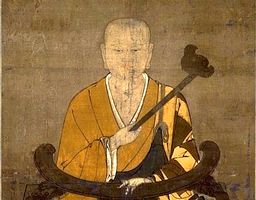Zhiyi
| PersonType | Category:Classical Chinese Authors Category:Ordained (Monks and Nuns) |
|---|---|
| MainNamePhon | Zhiyi |
| MainNameChi | 智顗 |
| MainNamePin | Zhìyǐ |
| AltNamesOther | Śramaṇa Zhiyi (Ch. 沙門智顗) · Chen De'an (陳德安) · Master Tiantai(天台大師) · Master Zhizhe(智者大師) · Chih-i · Chih'i |
| YearBirth | 538 |
| YearDeath | 597 |
| BornIn | Gong'an County, Hubei, China |
| TibDateDay | 16 |
| TibDateMonth | 2 |
| TibDateDeathDay | 3 |
| TibDateDeathMonth | 8 |
| ReligiousAffiliation | Tiantai |
| StudentOf | Faxu (法緒) · Huikuang (慧曠) · Nanyue Huisi |
| IsInGyatsa | No |
| BnwShortPersonBio | (J. Tendai Chigi; K. Ch’ǒnt’ae Chiǔi) (538-597). One of the most influential monks in Chinese Buddhist history and de facto founder of the Tiantai zong. A native of Jingzhou (in present-day Hunan province), Zhiyi was ordained at the age of eighteen after his parents died during the wartime turmoil that preceded the Sui dynasty’s unification of China. He studied vinaya and various Mahāyāna scriptures, including the Saddharmapuṇḍarīkasūtra ("Lotus Sūtra'") and related scriptures. In 560, Zhiyi met Nanyue Huisi (515-577), who is later listed as the second patriarch of the Tiantai lineage, on Mt. Dasu in Guangzhou and studied Huisi’s teachings on the suiziyi sanmei (cultivating samādhi wherever mind is directed, or the samādhi of freely flowing thoughts), the "four practices of ease and bliss" (si anle xing), a practice based on the Saddharmapuṇḍarīkasūtra, and the lotus repentance ritual. Zhiyi left Huisi at his teacher’s command and headed for the Southern capital of Jinling (present-day Jiangsu province) at the age of thirty (567) to teach the Saddharmapuṇḍarīkasūtra and the Dazhidu lun for eight years at the monastery of Waguansi. The Shi chanboluomi cidi famen [alt. Cidi chanmen] are his lecture notes from this period of meditation and teaching. In 575, he retired to Mt. Tiantai (present-day Zhejiang province), where he built a monastery (later named Xiuchansi by the emperor) and devoted himself to meditative practice for eleven years. During this time he compiled the Fajie cidi chumen and the Tiantai xiao zhiguan. After persistent invitations from the king of Chen, Zhiyi returned to Jinling in 585 and two years later wrote the Fahua wenju, an authoritative commentary on the Saddharmapuṇḍarīkasūtra. Subsequently in Yangzhou, Zhiyi conferred the bodhisattva precepts on the crown prince, who later became Emperor Yang (r. 604-617) of the Sui dynasty. Zhiyi was then given the title Great Master Zhizhe (Wise One). Zhiyi also established another monastery on Mt. Dangyang in Yuquan (present-day Hunan province), which Emperor Wen (r. 581-604) later named Yuquansi. Zhiyi then began lecturing on what became his masterpieces, the Fahua xuanyi (593) and the Mohe zhiguan (594). At the request of the king of Jin, in 595 Zhiyi returned to Yangzhou, where he composed his famous commentaries on the Vimalakīrtinirdeśa, i.e., the Weimojing xuanshou and the Weimojing wenshou, before dying in 597. Among the thirty or so works attributed to Zhiyi, the Fahua xuanyi, Fahuawenju, and Mohe zhiguan are most renowned and are together known as the Tiantai san dabu (three great Tiantai commentaries). (Source: "Tiantai Zhiyi." In The Princeton Dictionary of Buddhism, 911–12. Princeton University Press, 2014. http://www.jstor.org/stable/j.ctt46n41q.27.) |
| Other wikis |
If the page does not yet exist on the remote wiki, you can paste the tag |

